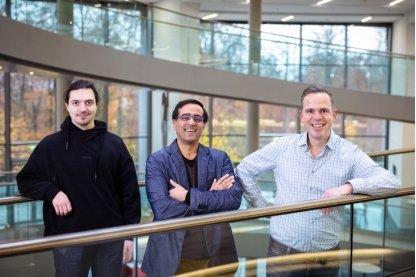Antibodies are an important tool in the human immune system’s arsenal against disease. They attach to bacteria, viruses, fungi, or toxins, marking them for destruction or removal from the body.
It is this ability to recognise and mark foreign and harmful molecules and organisms that allows therapeutic use of antibodies, including treating or preventing diseases such as cancer, as well as auto-immune and metabolic diseases. But while therapeutic antibodies offer great potential, selecting a promising candidate from billions of potential antibody sequences is laborious, expensive, and, in many cases, ineffective in identifying functional antibodies.
To address this challenge, former EMBL staff scientist Kashif Sadiq recently founded a start-up company: DenovAI Biotech. The company will create a platform in the field of de novo protein design, a computational approach to design proteins from scratch, rather than using a known structure. The company will primarily develop an AI-powered biophysics solution that can discover potential antibodies and small protein biologics and suggest which of these could be used therapeutically. In the near future, it may also provide capabilities beyond pharmaceutical biologics, including diagnostics, enzyme and biomaterial design. DenovAI will build on recent advances in protein structure prediction, artificial intelligence algorithms, computational molecular biophysics techniques, and increased availability of experimentally determined antigen-antibody structures.
Through DenovAI, Sadiq aims to combine AI and biophysics to discover the sequences and structures of antibodies that can recognise and bind strongly to any protein antigen. “This type of approach has not been taken before,” said Sadiq. “We have seen major advances in the field of therapeutic antibodies, from increased antibody library sizes to function-oriented discovery, but the process of developing new drugs is still incredibly slow, vastly expensive, and inefficient. With the support of AION Labs and its partners, we hope to develop a cutting-edge solution that will disrupt the whole field, cutting discovery timelines from months to days. This could dramatically broaden the scope of antibody therapy to many more diseases.”
DenovAI is the second startup to be formed by Israel-based AION Labs, which creates startups through a unique innovation model powered by BioMed X. After identifying specific industry R&D challenges, it carries out a global talent search for scientist founders. DenovAI is supported by investment from leading pharmaceutical companies Pfizer, AstraZeneca, Merck, and Teva, with close support from Amazon Web Services (AWS) and additional financial backing from the Israel Innovation Authority and the Israel Biotech Fund.
“Sitting at the intersection between biophysics, biotechnology and AI, DenovAI has the potential to revolutionise innovation in drug discovery. That is our shared goal,” said Mati Gill, CEO of AION Labs. “We look forward to providing DenovAI with our strong resources and mentorship as we work together to develop a solution to overcome the pharmaceutical challenge of selecting drug candidates from antibody sequences.”
During his time working in the research group of Jan Korbel at EMBL Heidelberg, Sadiq and EMBL PhD student Michael Jendrusch invented an AI-driven technology to design proteins. With DenovAI, Sadiq intends to harness this technology, which is licensed to the company by EMBL’s wholly owned commercial subsidiary: EMBL Enterprise Management Technology Transfer GmbH (EMBLEM). Jendrusch will also contribute to the company’s endeavours while completing his PhD at EMBL Heidelberg. “It is a fantastic opportunity for me to be involved in translating our theoretical research into real-life applications,” said Jendrusch.
EMBL Group Leader Jan Korbel added: “It is very exciting that DenovAI is taking on the potential of AI-driven therapeutic discovery, building on research coming from my laboratory at EMBL. Computational biologists have long been harnessing technology to answer biological questions. With recent major advancements in artificial intelligence methods, there are now very exciting opportunities ahead for pharmaceutical development, and it will be wonderful to see DenovAI engage and develop in this sector.”
The European Molecular Biology Laboratory (EMBL) is Europe’s life sciences laboratory. We provide leadership and coordination for the life sciences across Europe, and our world-class fundamental research seeks collaborative and interdisciplinary solutions for some of society’s biggest challenges. We provide training for students and scientists, drive the development of new technology and methods in the life sciences, and offer state-of-the-art research infrastructure for a wide range of experimental and data services.
EMBL is an intergovernmental organisation with 28 member states, one associate member, and one prospective member. At our six sites in Barcelona, Grenoble, Hamburg, Heidelberg, Hinxton near Cambridge, and Rome, we seek to better understand life in its natural context, from molecules to ecosystems.
EMBL Heidelberg
Meyerhofstraße 1
69117 Heidelberg
Telefon: +49 (6221) 387-0
Telefax: +49 (6221) 387-8306
http://www.embl.de
Press Officer
E-Mail: lisa.vollmar@embl.org
![]()

